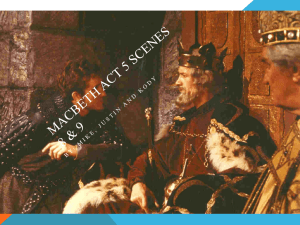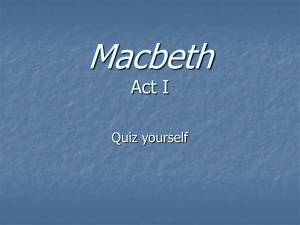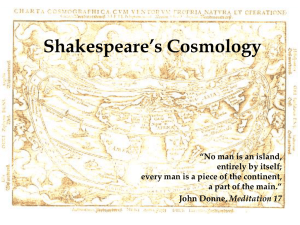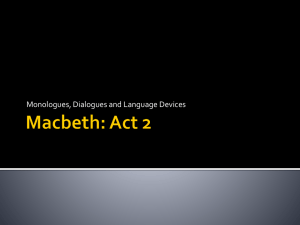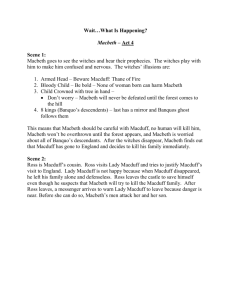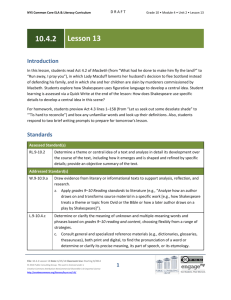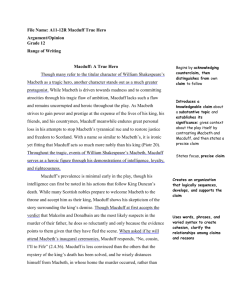Macbeth – act 2 / 1
advertisement
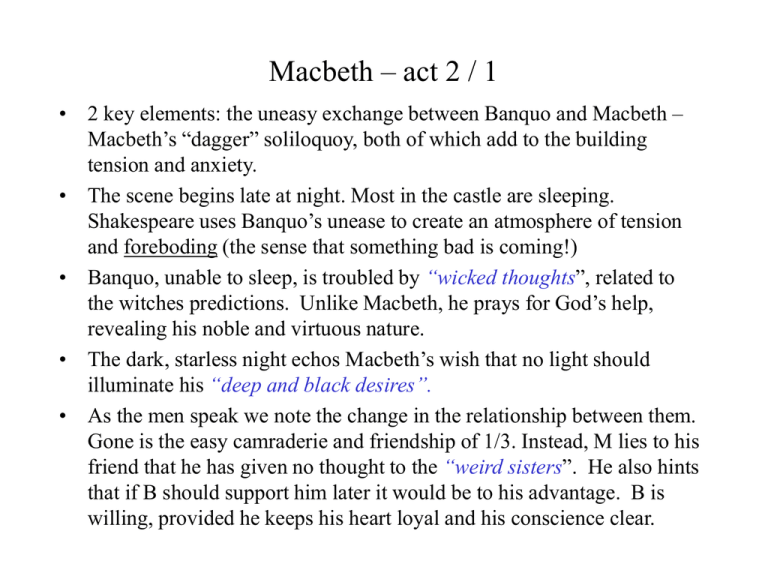
Macbeth – act 2 / 1
• 2 key elements: the uneasy exchange between Banquo and Macbeth –
Macbeth’s “dagger” soliloquoy, both of which add to the building
tension and anxiety.
• The scene begins late at night. Most in the castle are sleeping.
Shakespeare uses Banquo’s unease to create an atmosphere of tension
and foreboding (the sense that something bad is coming!)
• Banquo, unable to sleep, is troubled by “wicked thoughts”, related to
the witches predictions. Unlike Macbeth, he prays for God’s help,
revealing his noble and virtuous nature.
• The dark, starless night echos Macbeth’s wish that no light should
illuminate his “deep and black desires”.
• As the men speak we note the change in the relationship between them.
Gone is the easy camraderie and friendship of 1/3. Instead, M lies to his
friend that he has given no thought to the “weird sisters”. He also hints
that if B should support him later it would be to his advantage. B is
willing, provided he keeps his heart loyal and his conscience clear.
Macbeth – act 2 / 1
• Again, this points to the moral difference between the two men.
• The dagger solilioquoy illustrates M’s inner turmoil as he prepares for
ther murder. It can be split into two parts.
– The ghostly dagger achieves two purposes. It allows M to draw his own
dagger (as a comparison to the one he sees) and allows him to make his
way to the king’s chamber (by following the dagger as it moves through
the air). It’s as though he does this in a sort of trance…suddenly finding
himself outside the king’s chamber with dagger in hand! This allows him
to
• Draw his dagger
• Make his way to the king’s chamber
• Retain our sympathy.
• The second part also reveals his overwrought mind…
– He imagines that the sleeping world plunged into darkness. It is abused by
“wicked dreams” and that “withered murder” creeps along like a ghost.
– As the bell rings signalling the time for the deed, the tension mounts for the
audience as we move ever closer to the murder.
Macbeth – act 2 / 2
Shakespeare doesn’t show the murder, which happens offstage, choosing instead
to focus our attention on Macbeth and his horrified, guilty reaction. This, in
fact, is the main purpose of the scene: to show his suffering and maintain our
sympathy / pity for him.
He’s a pitiful figure, carrying the bloody knives, complaining of hearing voices,
horrified. He’s afraid to return the bloody knives to the scene. He thinks he
heard voices saying that he had murdered sleep therefore he will sleep no
more….and so on. This demonstrates to the audience how utterly distraught,
thinking about what he has done. This is important because it allows us to focus
more on his suffering than on his bloody deed.
LM chides him for thinking in this way. He has become somewhat hysterical.
Three times she counsels him – “consider it not so deeply” and “these deeds
must not be thought after these ways: so, it will make us mad”. Also she tells
him, “You do unbend your noble strength to think so brainsickly (hysterically)
of things.
However, LM is trying to suppress her humanity. She too is shaken by events. She
has had to fortify herself with drink to maintain her composure. She could not
bring herself to kill Duncan because he resembled her father as he slept. And
her words to M turn out to be terribly prophetic particularly for herself.
Act 2/2
• In contrast to LM’s claim that a little water clears us of the
deed, M knows that the effect of his crime will spread
rather than be washed away. “Will all great Neptune’s
ocean wash this blood clean from my hand? No, this, my
hand will rather the multidudinous seas incarnadine”.
• The following are of particular note for how the play
develops later on. Particularly regarding LM herself.
–
–
–
–
The notion that Macbeth has murdered sleep…
The effect of thinking too deeply about things.
The idea that “a little water clears us of the deed”
Lady Macbeth taking a leading role in matters.
Act 2 / 3
• A longer scene. 5 key moments
– The porter imagining being the gate keeper of hell.
• Despite providing comic relief the porter mentions issues like equivocation
and treason, both of which play crucial parts in the play as a whole.
• Also, in a way he has become gate keepeer of hell, given that Ms castle has
become a place of treason, murder, evil and deciet. M’s castle has become a
kind of hell.
– Macduff and Lennox arrive
• Note carefully Lennox’s description of the night just passed. The natural world
has reacted to the unnatural murder of the king.
– The discovery of the body
• The magnitude of the crime is revealed as Macduff describes it as
“sacriligious” and the king’s body as “the Lord’s annointed temple”.
• Macbeth kills the chamberlains to ensure their silence – claiming it was an act
of furious love for the dead king. This marks another step in his moral
decline….the first murders he commits without consulting his partner in
evil…LM
• It’s interesting that Macduff is the one to immediately question Macbeth. His
initial suspicion and consequent rejection of Macbeth has dire consequences
later in the play.
Act 2 / 3
– Macbeth starts to exaggerate his explanation and overact his “grief” with
needlessly elaborate words surely drawing suspicion on himself.
• Lady Macbeth shows her ability to handle the crisis by staging a
faint to draw attantion away from her weakening husband.
– Her ability to play false is remarkable. She had earlier declared “woe,
alas! What, in our house?” in response to the king’s death. Now she sees
the situation deteriorating and steps in to rescue the moment.
– She will have to do this again later to save her struggling husband!
– What’s also interesting is that Banquo doesn’t seem entirely convinced by
Macbeth’s actions either. He has “scruples” or doubts and wants to
“question this most bloody piece of work, to know it further”
• Malcolm and Donalbain, who have remained silent until now, wisely
decide to flee the castle whilst the others have gone to get dressed.
– Malcolm describes the murderous act as an arrow that is still in flight. It
may strike other targets before it has finished it’s work. They will flee in
order to remain safe.
– He notes wisely that “to show an unfelt sorrow is an office which the false
man does easy”….these observations add to the theme of false
appearances which runs throughout the entire play.
Act 2 / 3
• So, this slightly longer scene adds to some of the themes
we’ve already seen
–
–
–
–
–
–
False appearances
Supernatural evil
Treason
Kingship / the chain of being
Murder
Macbeth’s tortured mind / guilt / inner suffering / moral decline.
• And sets up the beginnings of suspicion by
– Macduff and Banquo
Act 2 / 4
• A short scene based around a conversation between Ross, an old man
and Macduff. Its purpose is to fill the audience in on what’s been
happening in the days since the murder.
• Malcolm and donalbain’s sudden departure has aroused some
suspicions.
– Ross quite easily seems to accept that they may have indeed been
involved.
• In their absence Macbeth has been named the new king and will be
crowned at Scone.
– Ross tells Macduff that he will attend the ceremony.
– However, we see Macduff distancing himself from Macbeth by
refusing to attend the coronation ceremony, this is consistent with
his earlier suspicion about the killing of the chamberlains.
• The order in the natural world continues to break down.
– It is daytime but the sky is dark, an owl attacks and kills a falcon, and the
kings horses have turned wild and savagely eaten each other. As the old
man (representing the ordinary people of Scotland) describes the
situation..”it is unnatural even like the deed that’s done”.
Act 2 / 4
• Macduff’s closing comments are interesting and prophetic.
“Lest our old robes sit easier than our new”. He means – in
case Duncan’s reign turns out to be better than Macbeth’s.
“robes” being a metaphor for the experience of life under
the king – old and new.
Significant quotes – scene 1
• There’s husbandry in heaven, their candles are all out (B)
• Merciful heavens restrain in me the cursed thoughts that nature gives
way to in repose. (B)
• I dreamt last night of the three weird sisters: to you they have showed
some truth. (B)
• I think not of them. (M)
• But still keep my bosom franchised and my allegiance clear. (B)
• Art thou but a dagger of the mind, a false creation proceeding from the
heat oppressed brain? (M)
• There’s no such thing, it is the bloody business which informs thus to
mine eyes. (M)
• The bell invites me. Hear it not Duncan, for it is a knell that summons
thee to heaven or to hell. (M)
Quotes scene 2
• That which hath made them drunk hath made me bold / what quenched
them hath given me fire. (LM)
• Had he not resembled my father as he slept I had done’t. (LM)
• But wherefore could I not pronounce ‘amen’. I had most need of
blessing and ‘amen’ stuck in my throat. (M)
• These deeds must not be thought after these ways: so, it will make us
mad. (LM)
• Methought I heard a voice cry ‘sleep no more, Macbeth does murder
sleep’. (M)
• I am afraid to think what I have done, look on’t again I dare not. (M)
• Will all great Neptunes ocean wash this blood clean from my hand?
(M)
• A little water clears us of this deed; how easy it is then! (LM)
• Wake Duncan with thy knocking! I would thou couldt! (M)
Quotes scene 3
•
•
•
•
•
•
•
•
•
•
The night has been unruly. Where we lay our chimneys were blown down and
as they say, lamentings heard in the air; strange screams of death…..some say
the earth was feverish and did shake (Lennox)
Most sacriligious murder hath broke ope the Lord’s annointed temple..
(Macduff)
What’s the business that such a hideous trumpet calls to parley the sleepers of
the house? (LM)
Woe, alas, what? in our house? (LM)
Had I but died an hour before this chance I had lived a blessed time….there’s
nothing serious in mortality. All is but toys! (M)
O, yet I do repent me of my fury that I did kill them. (M)
Wherefore did you so? (Macduff)
Let us meet and question this most bloody piece of work, to know it further…
(Banquo)
An unfelt sorrow is an office which the false man does easy. (Malcolm)
There’s daggers in men’s smiles, the near in blood, the nearer bloody.
(Donalbain)
Quotes scene 4
• By the clock tis day, and yet dark night strangles the
travelling lamp…that darkness does the face of earth
entomb. (Ross)
• Tis unnatural, even like the deed that’s done. (Old man)
• Duncan’s horses….turned wild in nature. (Ross)
• Tis said they eat each other. (Old man)
• Malcolm and donalbain, the king’s two sons are stolen
away and fled which puts upon them suspicion of the deed.
(Macduff)
• Will you to Scone? {For Macbeth’s coronation} (Ross)
• No cousin, I’ll to Fife. (MD)
• Well may you see things done…lest our old robes sit easier
than our new! (MD)





